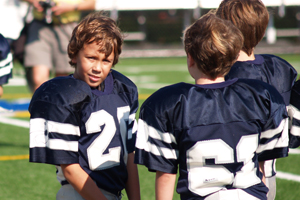 Concussions arise from an injury to the tissues or blood vessels in the brain. These can occur when the soft tissues are pressed against the bone of the skull, resulting from an impact or blow to the head experienced during a fall or from sports injury. They can also occur from being forcefully shaken. Mild concussions in childhood are common and often are not a cause for serious health concern. However there are rare cases of childhood concussion that should not be taken lightly and it’s important to know what symptoms need to be looked for.
Concussions arise from an injury to the tissues or blood vessels in the brain. These can occur when the soft tissues are pressed against the bone of the skull, resulting from an impact or blow to the head experienced during a fall or from sports injury. They can also occur from being forcefully shaken. Mild concussions in childhood are common and often are not a cause for serious health concern. However there are rare cases of childhood concussion that should not be taken lightly and it’s important to know what symptoms need to be looked for.
The general symptoms of concussion are varied, and depend on the severity of the injury and the individual themselves. Possible symptoms include dizziness, loss of consciousness and seizures. The latter two symptoms indicate a severe case of concussion (although a loss of consciousness itself may not be dangerous if short lived). However, symptoms that appear later could also be danger signs. A very common symptom experienced after a concussion is headache that may be mild to moderate in intensity. A blow to your child’s head could also cause changes in their mood, such as crankiness and loss of interest in favorite items. The way a child plays or works at school may be affected. After a concussion, a child may forget things or have difficulties in thinking, with possible short-term memory loss. Drowsiness and reduced energy are also common.
Concussion may be dangerous, because some of the symptoms are so mild that they are difficult to notice – some children act normal, even if they don’t feel normal. Concussion makes it difficult to detect the symptoms in your child, unless they tell you they’re feeling strange. Ask your child if they have any of the symptoms, and make sure to observe them closely for a few weeks. Your child is at increased risk if they have experienced previous head injury, are taking a blood thinning medicine, suffer bleeding disorders, are under one year old, have other neurological problems, have difficulty walking or are active in high contact sports.
If your child is harder to wake up than normal, shows worsened symptoms, won’t stop crying, doesn’t eat well, has worsening headaches or symptoms that have lasted longer than six weeks, then contact your doctor or caregiver. If your child shows a change in personality, bleeds out of the ears or nose, has trouble recognizing people, or vomits repeatedly, go to the emergency room. For seizures, unequal pupil size and longer-term unconsciousness, dial 911.
Irrespective of advice you get on the internet or by phone, if you have any doubt in your mind about your child’s health after a head injury, seek the help of a professional. You know your child best!














